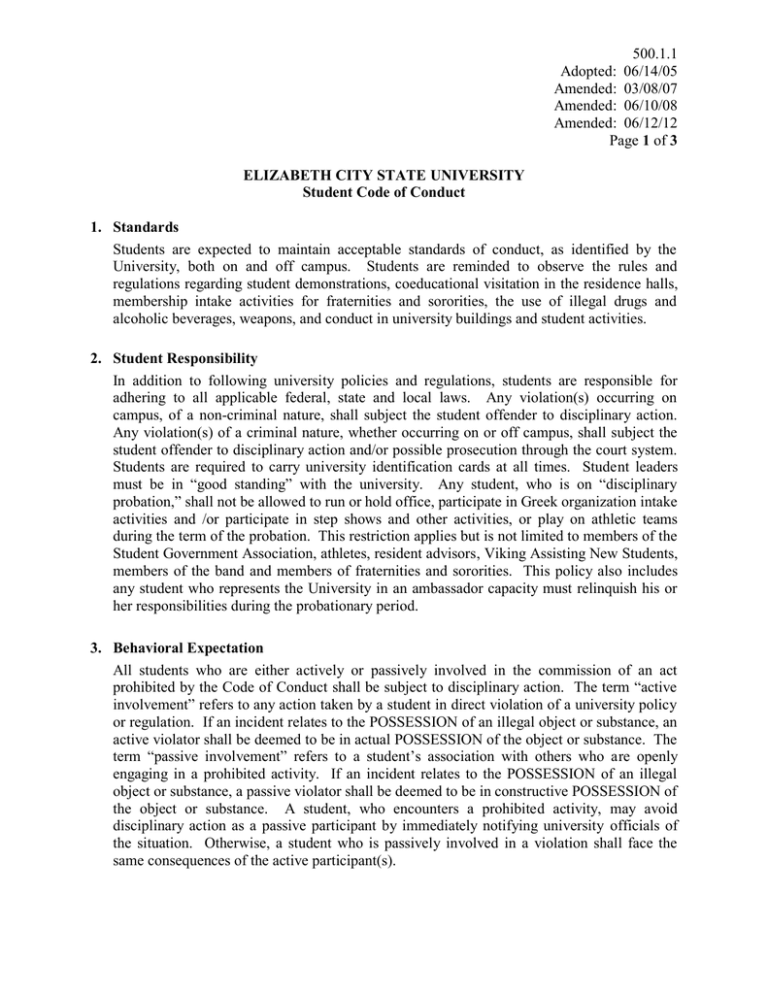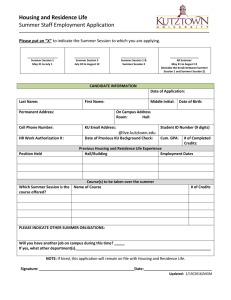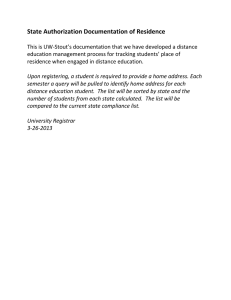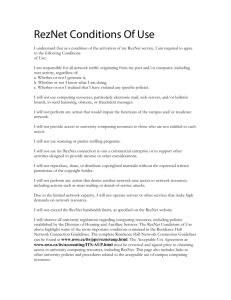500.1.1 Adopted: 06/14/05 Amended: 03/08/07 Amended: 06/10/08
advertisement

500.1.1 Adopted: 06/14/05 Amended: 03/08/07 Amended: 06/10/08 Amended: 06/12/12 Page 1 of 3 ELIZABETH CITY STATE UNIVERSITY Student Code of Conduct 1. Standards Students are expected to maintain acceptable standards of conduct, as identified by the University, both on and off campus. Students are reminded to observe the rules and regulations regarding student demonstrations, coeducational visitation in the residence halls, membership intake activities for fraternities and sororities, the use of illegal drugs and alcoholic beverages, weapons, and conduct in university buildings and student activities. 2. Student Responsibility In addition to following university policies and regulations, students are responsible for adhering to all applicable federal, state and local laws. Any violation(s) occurring on campus, of a non-criminal nature, shall subject the student offender to disciplinary action. Any violation(s) of a criminal nature, whether occurring on or off campus, shall subject the student offender to disciplinary action and/or possible prosecution through the court system. Students are required to carry university identification cards at all times. Student leaders must be in “good standing” with the university. Any student, who is on “disciplinary probation,” shall not be allowed to run or hold office, participate in Greek organization intake activities and /or participate in step shows and other activities, or play on athletic teams during the term of the probation. This restriction applies but is not limited to members of the Student Government Association, athletes, resident advisors, Viking Assisting New Students, members of the band and members of fraternities and sororities. This policy also includes any student who represents the University in an ambassador capacity must relinquish his or her responsibilities during the probationary period. 3. Behavioral Expectation All students who are either actively or passively involved in the commission of an act prohibited by the Code of Conduct shall be subject to disciplinary action. The term “active involvement” refers to any action taken by a student in direct violation of a university policy or regulation. If an incident relates to the POSSESSION of an illegal object or substance, an active violator shall be deemed to be in actual POSSESSION of the object or substance. The term “passive involvement” refers to a student’s association with others who are openly engaging in a prohibited activity. If an incident relates to the POSSESSION of an illegal object or substance, a passive violator shall be deemed to be in constructive POSSESSION of the object or substance. A student, who encounters a prohibited activity, may avoid disciplinary action as a passive participant by immediately notifying university officials of the situation. Otherwise, a student who is passively involved in a violation shall face the same consequences of the active participant(s). 500.1.1 Adopted: 06/14/05 Amended: 03/08/07 Amended: 06/10/08 Amended: 06/12/12 Page 2 of 3 4. Involuntary Withdrawal/Residence Hall Suspension (a) A student who violates the Code of Conduct or engages in behavior that potentially poses a threat to his/her life or others may be subject to an involuntary withdrawal and/or suspension from a residence hall. Under this section, involuntary withdrawal refers to a student separation from the university that is administratively initiated by the Vice Chancellor for Student Affairs (or designee) for behavioral reasons. Under this section, suspension from a residence hall refers to an administrative separation of a student from a residence hall for behavioral reasons. If an involuntary withdrawal and/or residence hall suspension is administratively imposed, a student may seek readmission to the university or a residence hall reassignment after at least one (1) semester on the condition that he/she can document stable behavior. The student must produce documentation from a treating physician, psychologist or other qualified professional who gives an opinion that the student is ready to return and cope with the university life to be considered at that time for readmission to the university and/or a residence hall reassignment. Reasonable efforts will be made by Student Affairs staff to help students understand the consequences of their behavior make responsible decisions and develop skills to allow students to function successfully within the university community. Students who have a pending judicial charge are not allowed to withdraw from the university before the outcome of charges is completed on campus. (b) Students who have a pending judicial charge are not allowed to withdraw from the university before the outcome of charges is completed on campus. 5. Policy on Arrest and/or Conviction (a) University police officers are deputized by the State of North Carolina and have full enforcement and arrest powers of police officers. The University police officers are empowered to arrest students and other persons who violate state, local, and/or campus laws while on the campus of Elizabeth City State University. (b) Students who are charged with criminal acts by law enforcement agents (University Police, local police, state troopers, and sheriff deputies) in the form of felony or misdemeanor warrants may be suspended from the university immediately. It is the responsibility of each student to notify Student Affairs in writing of arrest(s). Failure to do so may result in disciplinary action. An Administrative (Investigative Review) Hearing will be held prior to such separations when feasible and in other cases, the appropriate hearing will be held after the separation at the request of the arrested students, or prior to readmission to the university. (c) Any student who is convicted in a local, state, or federal court of law for any cause may also be tried by a designated University judicial body to determine if such action violated regulations referred to in the Elizabeth City State University policies, 500.1.1 Adopted: 06/14/05 Amended: 03/08/07 Amended: 06/10/08 Amended: 06/12/12 Page 3 of 3 procedures, rules and regulations. Additional action and/or punishment could occur pursuant to university policy. Records of students kept on file for some violations are destroyed after one year. 6. Emergency Rules & Behaviors (a) During emergencies (power outages at night, severe weather, etc.) all residents are to remain inside their respective residence halls until power is restored or normal operations are resumed. (b) Any student caught wandering on the university grounds, loitering around buildings or inside buildings in violation of Coeducation rules, will be suspended from the university and/or arrested and prosecuted. (c) Any student who must leave a residence hall or enter a residence hall for emergency reasons must be cleared by the residence hall staff person on duty or a university official.


